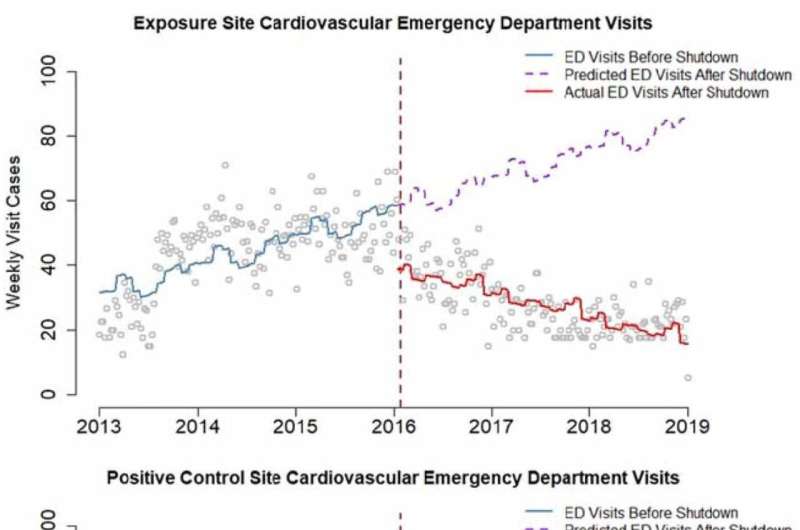This article has been reviewed according to Science X's editorial process and policies. Editors have highlighted the following attributes while ensuring the content's credibility:
fact-checked
trusted source
proofread
Closure of Pittsburgh coal-processing plant tied to local health gains

The closure in January 2016 of one of Pittsburgh's biggest coal-processing plants led to immediate and lasting declines in emissions of fossil fuel-related air pollutants. These in turn were linked to near-instant decreases in local heart-related emergency department visits and hospitalizations for cardiovascular diseases, a new study shows. The impact of the closure persisted through at least December 2018, the last month for which data were analyzed.
Led by researchers at NYU Grossman School of Medicine, the study was designed to assess the short- and longer-term health effects of the shutdown of the Shenango Coke Works facility, which for more than 50 years produced coke, a coal-derived product needed for steelmaking. Before closing under community pressure, the plant had incurred millions of dollars in government fines for air and water pollution.
Although the study, performed in a real-life situation, did not demonstrate a cause-and-effect link between any individual's health and the plant closure, the results of the "natural experiment" showed a strong overall statistical association between the closure and measures of improved health, such as reduced visits to the emergency department, the researchers say.
Publishing in the journal Environmental Research: Health online July 31, the study showed that average daily levels of sulfur dioxide, a major toxic chemical component in air pollution and by-product of coke-making, fell by 90% at government air-monitoring stations near the plant and by 50% at another air-monitoring station roughly 10 kilometers (more than six miles) away. Arsenic in particulate matter, another coal-combustion by-product that can be inhaled, fell by 66%.
Analyses of state health records showed that average weekly visits to the local emergency departments for heart-related problems decreased by 42% immediately after the shutdown.
Similar downward trends were observed locally over the long term, with 33 fewer average yearly hospitalizations for heart disease from 2016 through 2018 compared to the three years preceding the plant closure. This included 13 fewer average yearly hospitalizations for ischemic heart disease (typically heart attack) and 12 fewer average yearly hospitalizations for cerebrovascular events (most often stroke).
By contrast, study findings showed no corresponding postclosure drop in trauma-related injuries as reported in visits to the emergency department, an indicator that the cardiovascular health gains were not due to some overall drop in population or in accidents needing emergency care.
In addition, the researchers looked for and found no parallel decreases in air pollution, emergency department visits, and hospitalizations in communities near a still-operating coke plant in Clairton, Pa., or in Johnston, Pa., a town 120 kilometers (75 miles) east of Pittsburgh that has no comparable air-polluting manufacturing operations. The researchers say air quality and health insurance data from these regions acted as "research controls," allowing them to compare what happened after Shenango closed to what happened elsewhere in the state.
"Our research provides compelling scientific evidence that the closure of this coal-processing coke plant significantly eliminated fossil fuel-related air pollution emissions that improved the air quality and cardiovascular health of nearby residents," said study lead investigator Wuyue Yu, a doctoral science student at NYU Langone Health.
Numerous past studies have tied fossil fuel-related and other air pollutants to immediate upticks in asthma attacks and long-term increases in inflammatory conditions that lead to heart attack and stroke, adds Yu.
"The immediate and long-term benefits from dramatic reductions in exposure to air pollution are also analogous to the steady reductions in illness and disease that have been observed over time following smoking cessation," said senior study investigator George Thurston, ScD.
"Our analysis adds to the growing body of scientific evidence that policies implemented to regulate and reduce fossil fuel-related air pollution have real public health benefit," said Thurston, a professor in the Departments of Medicine and Population Health at NYU Langone.
For the study, researchers used data provided to the Pennsylvania Department of Health from hospital electronic health records. Researchers restricted their analysis to patients from ZIP codes immediately surrounding the Shenango and Clairton plants, as well as a government air-monitoring station in Johnston, Pa.
The researchers caution that while the Clairton plant and Johnston township closely mimic still-polluting and nonpolluting comparisons to the closed Shenango plant, they do not serve as perfect research controls. Other potentially confounding factors not included in the study, such as local improvements in lifestyle from diet or exercise, might explain some of the differences observed in the study.
Still, they say their study serves as another scientific milestone about the health benefits of cleaner air. It also provides a public-policy reminder about the need to carefully monitor air quality after closing polluting plants and to assess their health impact on nearby residents.
They also say their research could act as an effective guide to monitoring the health changes flowing from the closure of other fossil fuel-powered plants elsewhere and to using more natural experiments in public health research.
More information: Wuyue Yu et al, An interrupted time series analysis of the cardiovascular health benefits of a coal coking operation closure, Environmental Research: Health (2023). DOI: 10.1088/2752-5309/ace4ea





















